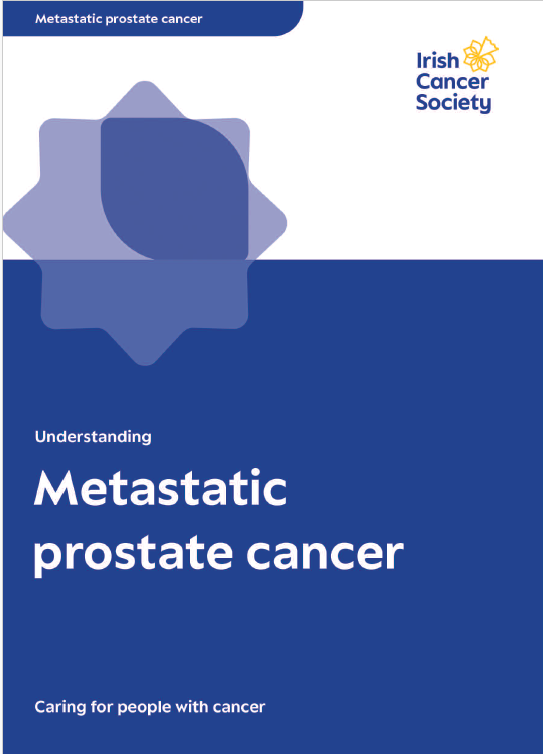Metastatic prostate cancer
Treatment
How is metastatic prostate cancer treated?
The aim of treatment is to:
• Slow down the growth and spread of the cancer
• Relieve your symptoms
• Improve your quality of life
Although it isn’t possible to cure metastatic prostate cancer with
current treatments, there are many treatments that can keep the
cancer and its symptoms under control, sometimes for many years.
For some people, living with metastatic prostate cancer is like living
with a chronic (long-term) illness. Your specialist will tell you about
the likely progress of your cancer and what you might expect.
Common treatment options include:
Prostate cancer cells use your body's own hormone testosterone to grow. Hormone therapy reduces the amount of the hormone testosterone in your body to help slow the growth of the cancer.
Hormone therapy is the main treatment for metastatic prostate cancer. Your doctor may also recommend other treatments, in combination with your hormone therapy or as an alternative.
Read more about hormone therapy for metastatic prostate cancer.
Chemotherapy is a treatment using drugs to help kill cancer cells
that have travelled to other parts of your body. Chemotherapy may be used at the start of your treatment in combination with hormone therapy, if your doctor feels you are well enough.
Chemotherapy is given to help:
• Shrink your prostate cancer
• Slow down the growth of your cancer
• Control symptoms such as pain
• Improve your quality of life
What kinds of drugs are used?
Some examples of chemotherapy used for prostate cancer are docetaxel (Taxotere®) and cabazitaxel (Jevtana®). You may be given a steroid with your chemotherapy to reduce the side-effects of treatment. You may also be given growth factors to help your white blood cells recover after your chemotherapy.
How often will I have chemotherapy?
The chemotherapy drugs are often given in cycles, such as once a week or once every 2 or 3 weeks, usually with a rest period between treatments. The rest period allows your body to recover from the effects of the drugs. The number of cycles you receive will depend on how well the cancer is responding to treatment.
Read more about chemotherapy.
Radiotherapy for metastatic prostate cancer aims to control the
cancer and relieve symptoms, such as pain. It may also be used to
treat your prostate cancer if you have low volume disease.
Two types of radiotherapy can be used for metastatic prostate cancer:
- External radiotherapy
High-energy rays are aimed at the cancer. - Radioactive injections
Radioactive liquid injections to help with prostate cancer that has spread to the bones.
Read more about radiotherapy for metastatic prostate cancer.
You might be given steroids either to take along with another treatment or on their own. Steroids can help to reduce the side-effects of certain drug treatments.
Side-effects from steroids include an increased appetite and mood changes. They can also cause bone thinning, a higher risk of diabetes, fluid retention and other body changes. Your doctor will check for these side-effects regularly.
Read more about steroids.
Bone-strengthening drugs can help to reduce pain from cancer that has spread to the bone and may slow the growth of cancer in the bone. They can also help to prevent further bone loss and strengthen the bone to reduce the risk of bone damage, like fractures.
You may be given these drugs to protect your bones. The types of
drugs commonly used are:
- Bisphosphonates. For example, zoledronic acid (Zometa®)
- Monoclonal antibodies. For example, denosumab (Xgeva®).
Bisphosphonates can also reduce high levels of calcium in your blood.
It’s important to take bone-strengthening medications exactly as prescribed to get the best benefit and to avoid any interactions with other drugs.
Read more about bone-strengthening drugs.
A combination of hormone therapy and chemotherapy usually controls metastatic cancer. If your cancer has started to regrow your doctor may recommend a targeted therapy.
Targeted therapy drugs are designed to attack cancer cells without harming normal cells. They aim to affect the way that cancer cells grow, divide, repair themselves or interact with other cells.
Medicines used include olaparib and niraparib, which are PARP inhibitors. Their aim is to block the pathway that prostate cancer cells use, which often leads to the death of these cells. Some of the side effects of PARP inhibitors include:
• Nausea and vomiting
• Fatigue
• Shortness of breath
• Skin rash
• A low number of red blood cells (anaemia)
• Weakened immune system (neutropenia)
Read more about targeted therapies.
A medical oncologist is a doctor who specialises in treating cancer with drug treatments. These are often used for advanced (metastatic) cancer.
Understanding your drug treatment
Ask your doctor or specialist nurse about any medicines you’re taking:
- What they are for
- How to take them
- Any possible side-effects.
They may be able to give you a printed sheet to take home with you. Or ask our cancer nurses: Call our Support Line on 1800 200 700 or drop in to a Daffodil Centre.
Sexual side-effects of metastatic prostate cancer treatment
Treatment can affect your sex life in different ways:
- Hormone therapy: Erection problems and lower sex drive, due to having less of the male hormone testosterone.
- Radiotherapy: Erection problems, producing less or no semen at orgasm. Uncomfortable ejaculation.
- All treatments: You may be stressed, depressed, very tired or less confident because of your cancer diagnosis. You may also have other side-effects from treatment or physical changes to your body that make you feel differently about sex.
Not every man wants treatment for erectile problems. Some men accept the changes in their body and don't feel the need to get treatment. For other men, finding a way to treat their erectile dysfunction is very important. There is no right or wrong way to react – just the way that feels right for you.
The treatment options for erectile dysfunction include tablets, pellets that go into the eye of your penis, injections and vacuum pumps.
We have more information on these and other treatments for sexual side-effects, including erectile dysfunction in our sexual side-effects page.
- Give yourself time to recover, and don’t rush into sex if you don’t feel ready.
- It may help to talk openly to your partner or a counsellor about how you’re feeling.
- Talk to your specialist nurse if you’re worried about your sex life or sexual side-effects. Try not to feel embarrassed. They will be happy to talk to you and give you advice. You can also talk to one of our cancer nurses in confidence. Call Freephone 1800 200 700, email suuportline@irishcancer.ie or visit a Daffodil Centre.
Will treatment affect my fertility?
Most treatments for prostate cancer are likely to cause infertility. This means you will be unable to father a child in the future. If it is important to you, talk to your doctor about this side-effect before your treatment. If you are having sex and you are fertile, you should use a reliable method of contraception during and for some time after treatment.
Palliative care
Your doctor may refer you to specialist palliative care doctors and nurses, who are experts in managing the symptoms of advanced cancer, such as breathlessness, pain and nausea. They are also called the symptom control team.
You may be worried if your doctor suggests palliative care for you. You may think this means you are at the end of your life.
Palliative care does include end-of-life care, but it can also be given at other times to help to manage your symptoms and improve your quality of life, including while you are having other active treatments like chemotherapy. The palliative care team can complement your oncology (cancer care) team to help you to feel as well as possible during your treatment.
Read more about palliative care
Having palliative care doesn’t mean that you’re at the end of your life. The expertise of the palliative care team means that existing symptoms can be better managed and new problems can be spotted and treated early to help you to feel as well as possible.
Continue reading about metastatic prostate cancer




Get help & support

Support Line
Free support pack


